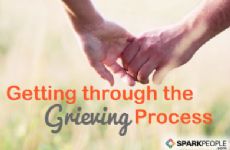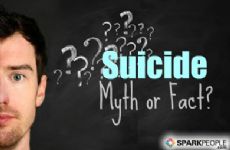|
Editor's note: If you or someone you know is suffering from a mental-health issue, please contact your health-care provider immediately. The information listed here is meant to inspire and offer hope but should not be interpreted as advice or recommendations. By Beth Donovan (~INDYGIRL) Among my health issues is a diagnosis of clinical major depression. It can be rather difficult to deal with depression and other mental health issues, especially on your own, so I wanted to share how I’ve dealt with my depression and anxiety, along with the help of my doctor and other health-care professionals. (If you think you're suffering from a mental health issue, talk to your health-care provider immediately.) First, I want to talk about my anxiety. I have experienced full-on panic attacks that have stopped me in the middle of a store and made me abandon my cart and leave. I felt dizzy, like the world was crashing in on me. I couldn’t breathe, and most of all I just had to escape. I was nauseated, sweaty, disoriented, and needed to lie down after such an experience. A therapist once told me the best advice I’ve ever heard that helped me with my panic attacks, and I find that it applies to binge eating, too: First there is an event that triggers the panic or the desire to binge, and then there is an emotion. We can either deal with that emotion or stuff it down with food or brute strength. Left undealt with, the emotion becomes another, even stronger event. Eventually one will give in and run or eat. The answer to the problem is to deal with the emotion as it comes. Ask yourself what you are feeling and why you are feeling that way. Then discern what could resolve those feelings: In other words, what action can you take? So the ideal model would be event-emotion-action. Without the action, you risk heading into complete downward spiral of emotion, panic, and bad choices (such as binging). I’m a strong believer in getting help when help is needed. I personally need medication for depression and anxiety, among other health issues. Brain chemistry is at the root of these problems, I have been told by my doctors. Medications help, but not immediately and not the same for everyone. If one medicine didn’t work, I didn’t give up, I moved on to the next. Not one medication works for everyone and I had to try many. I personally will not suffer needlessly the tortures of mental illness, when there is medication that can alleviate my pain and help me function better as a wife, a friend, and a worker. Talk therapy is another way I’ve gotten help. I’ve spent years talking it out. For me, it started in my teens. This was before the days of medication. Talk therapy was never very helpful to me until it was coupled with medicine and the right therapist. Sometimes you have to go through many therapists to find just the right one. Never give up though. Each therapist has his or her own personality and individual approach. I did learn of a few therapies to try at home. (Consult with your health-care provider before trying these for yourself.) Light therapy was one of them. Full spectrum lighting has been shown to help people with seasonal affective disorder, sometimes called the winter blues. Special lights create full spectrum light to mimic the sun and in turn boost moods, but are NOT tanning lights. Leisure therapy is probably my favorite. It is the theory and practice of taking time to do things you like as a hobby. Schedule some leisure time into your calendar as therapy time for yourself. This practice gives you something to look forward to and helps create a sense of well-being. Your time could be spent doing art, listening to music, practicing yoga, collecting things, shopping, traveling, or exploring a city. Whatever you do, it has to be something you like and not an obligation. Art therapy is taught almost everywhere there is therapy given on a more permanent level. It really engages the mind and senses. It brings out creativity and a sense of accomplishment. It’s also something you can do at home and even involve family members with, if you so desire. Art therapy is simply the creation of something. It can be done with everything from recycled objects to expensive canvases and paints. It also makes it very hard to dwell on things getting you down when you are pulling all of your emotions out and putting them into a piece of art. Writing is a way I get my emotions out and turn them into a piece of art. Let me close by sharing with you a poem I wrote when my mother died. It is very personal to me, but I’m among friends here: The Lie Bits and pieces in a book A worn-out slice of life Sticking to the pages Broken, old and dry. Petals fall, it cannot bloom On it’s own again. “You can’t go home,” they always say, And so I’ve never been. Things so vivid I just can’t see, Way too numb to cry, Beyond all recognition, Except in the mind’s eye. What life was once, it never was. I swear, I must have lied. Who will know the difference? Just hide it from the light. What do you use to help you with the blues or other emotional issues? |
More From SparkPeople |




















